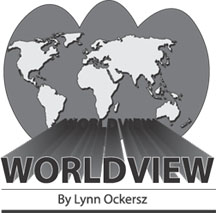|
observer |
|
|
|
|
|
OTHER LINKS |

|

|

|
A 'red' groundswell in the US backyard
This is the resounding re-election to the Brazilian Presidency of pro-poor campaigner. Luiz Inacio Lula da Silva. Victory addressIn his re-election victory address recently, da Silva was quoted as saying that he would take special care of Brazil's poor, whose vote played a prime role in sweeping him to power. He said he would govern Brazil for everyone but "the poor will have preference in our government." Da Silva went on to say that "the people felt that their lives have got better. There is no contest to this. Because the people felt in on their plates, on the table, in their pockets." Brazil is the latest of a number of Central and South American States where what one may call a socialist platform advocated by power contenders is proving popular. Venezuela, Nicaragua, Bolivia and Peru, to a degree, preceded Brazil going to the 'reds'. Together with the 'ever-red' Cuba, they form a formidable ideological bastion against the free market policy - championing US and its allies in the American continent. It is clear from this near socialist groundswell in the US' own backyard that typically Western prescriptions for alleviating poverty and deprivation are having increasingly less takers, at least in Central and Latin America. Contrary to the belief of many, that the days of the strait-jacketed, strongly State-controlled economy are over, there is a re-emergence of nationalist currents in the socialist-governed States of Central and Southern America. Violent protestsOne needs to only recall to mind Bolivian President Evo Morales' recent move to bring Western controlled oil enterprises under the control of Bolivia's army to gauge the vibrancy of these currents. Therefore, the West could no longer take for granted that its development model is being uncritically and universally accepted. The vocal and very often violent protests which greeted Western economic fora, featuring even some G8 countries, epitomise the growing unpopularity among some sections, of the Western development model which is seen as favouring growth over equity. To make matters worse, trade liberalisation talks under the FTO have now ground to a halt and deprived the Third World of a suitable trade negotiation forum with the West. To be sure, it would be a very long time before the world in its totality realises the pitfalls in the Western development strategy. Even in South Asia, for example, where the majority of the world's poor live, it is yet to be widely realised that economic liberalisation alone would not usher in development. It is yet to be realised that growth must match equity for development in the truest sense of the word to be made a reality. All this means that the State needs to be brought into the development picture, although not in an overbearing, repressive fashion, to guide the development experience. It is this realisation among sections of the Central and South American masses which has made socialist administrations popular in those parts of the world and given the likes of Lula da Silva another term in office. However, the West would do well to read the proverbial writing on the wall. It would do well to pay heed to a recent ILO report which revealed that one third of the world's youth are unemployed and living in abject poverty. Youth unemploymentThe highest increase in unemployed youth over the past decade is recorded in South East Asia with 85 per cent. The corresponding figures for other regions are: Subsaharan Africa, 34 per cent, Latin America 23 per cent, the Middle East 18 per cent and South Asia 16 per cent. This then is the price of emphasising market liberalisation at the expense of economic justice. The vibrancy of liberalised economies, apparently, does not translate fully into an absorptive capacity which ensures sustainable livelihoods for all. It may not be a bad idea at all to examine the virtues of micro credit and delve into the economic wisdom contained in Muhammad Yunus' Grameen Bank experiment, which proved 'little is beautiful'. |
 Hot foreign relations issues, such as the Bush administration's
handling of the Iraqi crisis, are likely to be figuring in the current
US Congressional election campaign, but a development of perhaps equal
significance in the US' own 'backyard' is probably not going to generate
the same degree of interest in the American public, although under
normal circumstances it would have made both the US law-maker and
elector alike 'see red'.
Hot foreign relations issues, such as the Bush administration's
handling of the Iraqi crisis, are likely to be figuring in the current
US Congressional election campaign, but a development of perhaps equal
significance in the US' own 'backyard' is probably not going to generate
the same degree of interest in the American public, although under
normal circumstances it would have made both the US law-maker and
elector alike 'see red'. 







